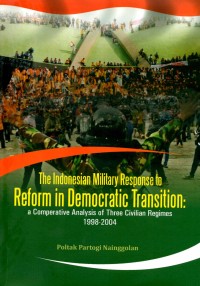Text
The Indonesian military response to reform in democratic transition: a comperative analysis of three civilian regimes 1998-2004
It was the objective of this study, to explore the relationship between the reform performance of Indonesia's civilian regimes in the security sector and the military's response to these reforms. The period of investigation spanned the entire process of democratic transition from the resignation of President Soeharto and the collapse of his authoritarian New Order regime in May 1998 to the end of the presidency of Megawati Soekarnoputri in October 2004. With the subsequent presidency of Susilo Bambang Yudhoyono Indonesia entered a period of political consolidation. By that time, a lengthy process of constitutional change had come to an end and ushered in a new presidential political system which has been rated by Freedom House and other democracy indices as the most democratic in Southeast Asia. Yet, the preceding analysis has shown that democratic consolidation is incomplete. By the end of the transition process the military as the former authoritarian regime's major pillar had regrouped and rescued many of its erstwhile privileges and reserved domains into the Era Reformasi. This thesis has examined the reasons why military reform in Indonesia was only partial and why military influence resurged in the post-Soeharto years. It departed from the theoretical transition literature, combining actor- oriented, structural and cultural perspectives. Empirically the study rests on extensive interviews, newspaper analysis, internet research and analysis of websites, publicly accessible documents, statistics and scientific literature. The study explored for each of the three transitional civilian presidencies between 1998 and 2004 (Habibie, Abdurrahman Wahid and Megawati Soekarnoputri) military responses to civilian reform overtures in areas such as prosecution of human rights violations by the military, the investigation of corruption cases (KKN -Kolusi, Korupsi, Nepotisme) involving the former President Soeharto and his cronies, separatism and Islamic radicalism.
Ketersediaan
Informasi Detail
- Judul Seri
-
-
- No. Panggil
-
355.6 POL t
- Penerbit
- Jakarta Pusat : Pusat Pengkajian, Pengolaha Data dan Informasi (P3DI)., 2012
- Deskripsi Fisik
-
xxvii+378 hlm.: 17x25 cm
- Bahasa
-
English
- ISBN/ISSN
-
9789799052742
- Klasifikasi
-
355.6
- Tipe Isi
-
text
- Tipe Media
-
-
- Tipe Pembawa
-
-
- Edisi
-
Cet. 1
- Subjek
- Info Detail Spesifik
-
-
- Pernyataan Tanggungjawab
-
Poltak Partogi Nainggolan
Versi lain/terkait
Tidak tersedia versi lain
Lampiran Berkas
Komentar
Anda harus masuk sebelum memberikan komentar

 Karya Umum
Karya Umum  Filsafat
Filsafat  Agama
Agama  Ilmu-ilmu Sosial
Ilmu-ilmu Sosial  Bahasa
Bahasa  Ilmu-ilmu Murni
Ilmu-ilmu Murni  Ilmu-ilmu Terapan
Ilmu-ilmu Terapan  Kesenian, Hiburan, dan Olahraga
Kesenian, Hiburan, dan Olahraga  Kesusastraan
Kesusastraan  Geografi dan Sejarah
Geografi dan Sejarah